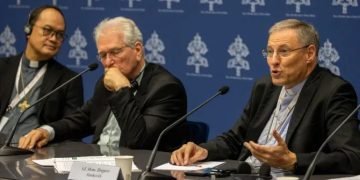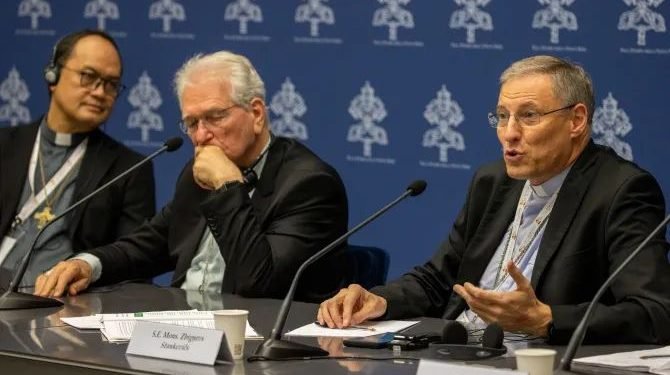By Charles Igwe
In a candid address at the Synod on Synodality, Archbishop Zbigņev Stankevičs of Riga, Latvia, expressed the Church’s stance on addressing issues related to same-sex unions, emphasizing the importance of love intertwined with truth.
During a synod press conference on October 18, Archbishop Stankevičs emphasized the Church’s teachings regarding individuals with same-sex attraction. He stressed that these individuals should be embraced with love and respect, reiterating Pope Francis’s belief that there is a place for everyone within the Church.
Archbishop Stankevičs made a poignant point by stating, “We welcome with love and respect, but true love cannot be separated from truth because if love is separated from truth, it is no longer love.”
In response to questions about blessing same-sex unions, Archbishop Stankevičs underlined the potential spiritual danger when telling someone living in what the Church considers sin that “everything is all right.” He expressed concern that such an approach could place that individual in great spiritual jeopardy, especially when considering their eternal well-being.
Furthermore, the archbishop touched upon the complementarity of men and women and advocated for giving women more significant roles within the Church without altering the Gospel’s teachings and the Church’s traditions.
Archbishop Stankevičs, who has led the Archdiocese of Riga since 2010, emphasized the importance of remaining faithful to the Holy Scriptures and the Church’s 2,000-year-old interpretations when addressing contemporary issues.
Regarding the blessing of individuals with same-sex attraction, he stated, “If a homosexual comes as an individual person and says, ‘I would like to live in God’s grace,’ I see no contraindication to pray for him and help him.”
He continued, “If two individuals come and say ‘we want to live in chastity … and we are tempted,’ you can pray for them and also bless them to help them live in chastity.”
However, when it comes to same-sex couples seeking blessings for living together as husband and wife, Archbishop Stankevičs voiced concerns, as it could be seen as blessing a life considered sinful according to the Church’s teachings.
He referred to the Catechism of the Catholic Church, which calls for the acceptance of people with same-sex attractions “with respect, compassion, and sensitivity,” and condemns unjust discrimination against them.
Archbishop Stankevičs shared a personal transformation, highlighting his pastoral evolution on this issue, stating, “Jesus says that we must love our neighbor … also homosexuals are our neighbors, and I must love them — to love in truth … and not a love that allows everything.”
This address at the Synod on Synodality by Archbishop Stankevičs serves as a reminder of the Church’s dedication to upholding its teachings while demonstrating compassion and sensitivity toward individuals with diverse backgrounds and orientations.










































